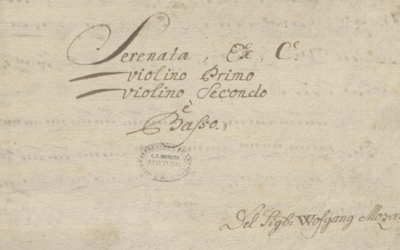Wolfgang Amadé Mozart
#1 The Hidden Truth of Mozart’s Education
@MozartrazoM
In this video, we uncover the hidden truth behind Wolfgang Amadeus Mozart’s early education and challenge the long-held belief in his effortless genius. While history often celebrates Mozart as a child prodigy, effortlessly composing music from a young age, the reality is far more complex.
Mozart’s father, Leopold, was a key figure in shaping not only his son’s musical development but also the public perception of his talent. Leopold, an ambitious yet frustrated musician, played an instrumental role in composing, transcribing, and promoting much of Wolfgang’s early music.
The works credited to young Mozart were, in fact, heavily guided or even written by Leopold. From manipulating Wolfgang’s age to enhancing his image as a prodigy, Leopold controlled his son’s rise to fame. We’ll explore key examples, such as the Minuet K.6, often believed to be one of Wolfgang’s first compositions, which was largely reworked by Leopold.
We’ll also discuss how Leopold’s ambition and control crafted the myth of Wolfgang as a child genius. Was Mozart’s talent truly his own, or was it carefully constructed by his father?
Join us as we delve into the untold story of Mozart’s education and the significant influence of Leopold on his son’s career. If you’re interested in challenging traditional narratives about Mozart and classical music history, this video is for you.
Don’t forget to like, comment, and subscribe to our channel for more videos on the real story behind Mozart’s legacy!
You May Also Like
#4 The Golden Spur
While often portrayed as a prestigious award, the Golden Spur (Speron d’Oro) granted to Mozart in 1770 was far from a reflection of his musical genius. In this article, we delve into the true story behind this now-forgotten honour, its loss of value, and the role of Leopold Mozart’s ambitions in securing it.
Mozart Unmasked: The Untold Story of His Italian Years
Explore the lesser-known side of Wolfgang Amadé Mozart’s early years in Italy. ‘Mozart in Italy’ unveils the complexities, controversies, and hidden truths behind his formative experiences, guided by meticulous research and rare historical documents. Delve into a story that challenges the traditional narrative and offers a fresh perspective on one of history’s most enigmatic composers.
Another Example of Borrowed Genius
The myth of Mozart’s genius continues to collapse under the weight of his reliance on others’ ideas, with Leopold orchestrating his son’s supposed early brilliance.
A Genius or a Patchwork?
The genius of Mozart had yet to bloom, despite the anecdotes passed down to us. These concertos were not the work of a prodigy, but a collaborative effort between father and son, built on the music of others.
Myth, Reality, and the Hand of Martini
Mozart handed over Martini’s Antiphon, not his own, avoiding what could have been an embarrassing failure. The young prodigy had a lot to learn, and much of what followed was myth-making at its finest.
Mozart’s Serenade? A New Discovery? Really?
In Leipzig, what was thought to be a new autograph of Mozart turned out to be a questionable copy. Why are such rushed attributions so common for Mozart, and why is it so hard to correct them when proven false?







